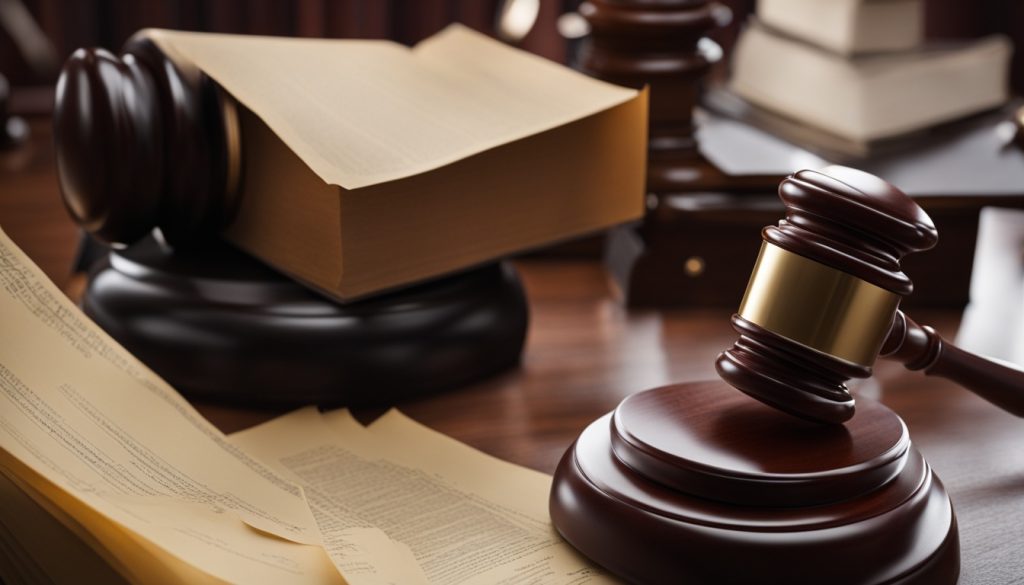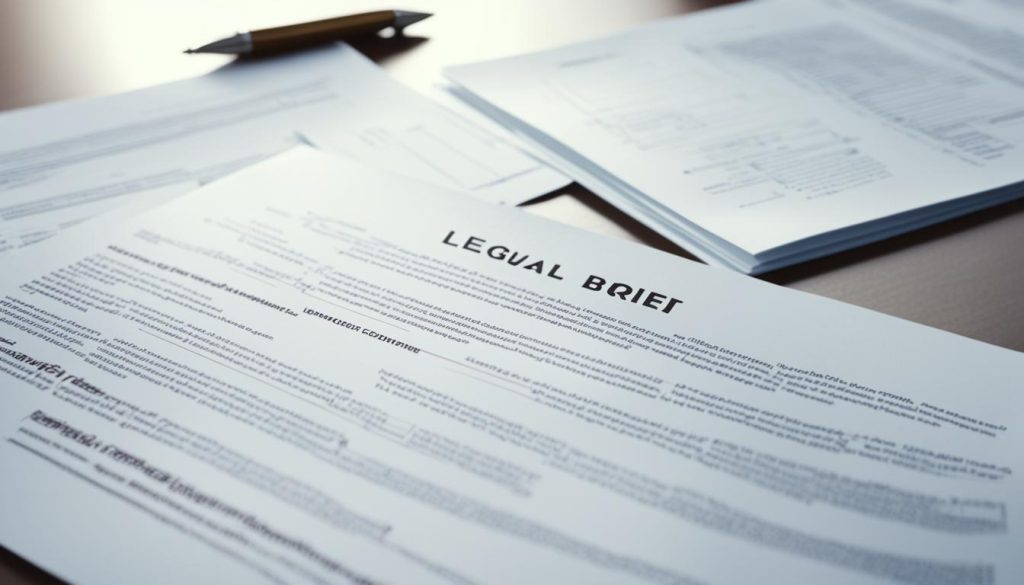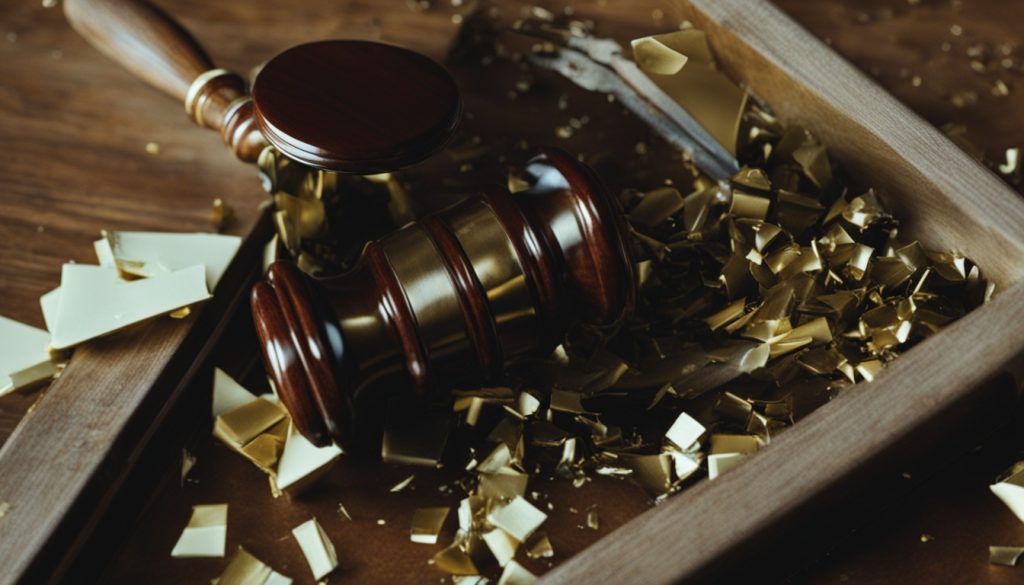Even if you’ve been found guilty, you might still have a chance to appeal. An appeal isn’t a new trial. It’s a way to challenge errors from your original trial. You can appeal if there was misconduct by police, prosecutors, or jurors, or if the evidence didn’t support the conviction1. Mistakes by the judge, wrong sentences, or serious legal mistakes can also lead to an appeal1.
The appeals process is complex and has tight deadlines. You must file a notice of appeal within 30 days after sentencing1. You also have to file a post-sentence motion quickly, giving the trial court 120 days to decide1. Once the appeal starts, the trial court will ask for a “Statement of Errors Complained of on Appeal” within 21 days1. You might get to make oral arguments before three Superior Court judges1. The whole process can take a year or more to finish1.
Key Takeaways
- You have the right to appeal a criminal conviction if you believe errors occurred during the trial or sentencing.
- Grounds for appeal can include misconduct, lack of evidence, or ineffective assistance of counsel.
- The appeals process is time-sensitive, with strict deadlines for filing notices and motions.
- The appeals process can be lengthy, potentially taking a year or more to resolve.
- Winning a criminal appeal can be challenging due to the complexity of the process and legal technicalities involved.
Understanding the Appeals Process
When dealing with criminal appeals, knowing the reasons for appeal is key. These reasons can be legal mistakes, juror wrongdoings, or poor legal help2. Mistakes in law can happen when wrong evidence is let in, jury instructions are wrong, or there’s not enough proof of guilt. For an appeal to work, the higher court must find these mistakes changed the case’s outcome. If they think the mistakes didn’t matter, the original verdict stays2.
Legal Errors and Grounds for Appeal
Juror wrongdoings are another reason for appeal. This includes using experiments, being drunk or high during the trial, or talking to witnesses or lawyers wrongly2. Also, if someone feels they didn’t get fair legal help, they might appeal. To win this claim, they must show things would have gone differently with better legal advice2.
Most places don’t let defendants appeal if they pleaded guilty, but those who went to trial can always appeal2. But, in places with the death penalty, there’s an automatic appeal for death sentences2. On the other side, prosecutors can’t appeal a “not guilty” verdict because of the Fifth Amendment’s Double Jeopardy Clause2.
The appeals process is complex, with only a few cases going to the highest state court2. Appeals to federal court need to focus on a federal issue2. Remember, an appeal isn’t a new trial but a review of what happened in the first trial2. Briefs and arguments in court are key to making the case2.
| Grounds for Appeal | Explanation |
|---|---|
| Legal Error | Improperly admitted evidence, incorrect jury instructions, or lack of sufficient evidence to support a guilty verdict |
| Juror Misconduct | Use of experiments, drug/alcohol abuse during deliberations or trial, improper communications between jurors and witnesses or counsel |
| Ineffective Assistance of Counsel | Defendant must prove that the outcome of the case would have been different but for their counsel’s actions |
Understanding appeals and their reasons helps people facing criminal charges navigate the legal system better23.
Navigating the State and Federal Court Systems
If you’ve been convicted in a state court, your appeal journey starts with the state court system. First, you’ll appeal to an intermediate-level state appellate court4. If you lose there, you might appeal to your state’s highest court.
The names of state courts vary. For example, California’s top court is the California Supreme Court. In New York, it’s the New York State Court of Appeals, not the New York State Supreme Court which is a trial court4.
But, getting your case reviewed by the highest state court is not guaranteed. It’s only for a few cases4. If your case has a federal angle, you could move to the federal courts.
Those convicted in federal court can appeal directly to the federal appellate court5. If they lose there, they might appeal to the U.S. Supreme Court.
Dealing with the courts can be tough. But, getting help from lawyers who know about appeals can make a big difference4. They can guide you through the process and boost your chances of success.
| Court System | Appeals Process |
|---|---|
| State Court |
|
| Federal Court |
|

The appeals process is complex and takes time. But, with the right legal advice and effort, you can challenge your criminal conviction in both state and federal courts45.
Preparing for the Appeal
Appealing a criminal conviction is a complex legal process. It requires careful planning. Unlike a retrial, the appellate court looks at the lower court’s record. They check if there are valid reasons to grant the appeal6.
This record includes all motions before and after the trial, the evidence, and a full transcript of the trial6.
The appellate court also looks at the written briefs from each side. These briefs explain the legal issues and argue for each side6. Sometimes, the court may hear oral arguments to clarify points from the briefs6.
| Time Frames for Appealing | Felony Cases | Misdemeanor Cases |
|---|---|---|
| Notice of Appeal Filing Deadline | 60 days after conviction6 | 30 days after conviction6 |
| Seeking Bail Pending Appeal | Factors like attendance record and community ties considered6 | Factors like attendance record and community ties considered6 |
Creating a strong appeal brief is key. It should have solid legal arguments and point out any evidential errors6. The appeal process takes time, but understanding it well and preparing carefully can help get a good result67.,

criminal appeal, legal process, conviction appeal
If you’ve been convicted of a crime, the appeals process might be your chance to change the outcome and get justice. It’s key to know about the criminal appeal process, especially if you face judicial misconduct, constitutional violations, or a wrongful conviction8.
After a verdict, you have a short time to appeal. In Pennsylvania, you have 30 days, and in federal court, it’s just 10 days9. If you miss this deadline, you could lose your right to appeal10.
The appeals process takes time, often over a year10. But, it might be worth it. A successful appeal could lead to a new trial or clearing your name9.
Finding your way through the courts is tough. But, with a skilled appellate lawyer, you can find legal reasons to appeal, like ineffective assistance of counsel, improper jury instructions, or prosecutorial misconduct9.
The appeals process is more than just trying to clear your name. It’s about making sure the justice system works right and protects your rights8. By appealing, you’re fighting for your freedom and helping to keep the justice system fair8.

In state or federal court, the appeals process is similar. The court reporter has a deadline to prepare the trial transcript. Then, your lawyer must file the Record on Appeal quickly8. The prosecutor gets to respond, and once the Record is ready, it goes to the appellate court8.
The last step is the decision from the appellate court, which can take a while8. If they find errors, they might reverse the conviction, clear your name, and send the case back for a new trial8.
The criminal appeal process is complex, but with the right legal help and a strong fight for your rights, you can make it through. Remember, justice is a journey that doesn’t stop after the first verdict9.
Conclusion
The criminal appeal process is complex but important for defendants to challenge legal mistakes or unfair results. It’s key to know the grounds for appeal and how to prepare your case, whether in state or federal courts11.
In New York, a defendant gets an automatic right to appeal a felony conviction to the Appellate Division11. For misdemeanors, appeals go to the county court11. Also, a defendant can appeal a sentence if it’s seen as too harsh or illegal11.
In Florida, you have thirty days to appeal after a conviction12. The appellate court decides if they’ll hear your appeal12. Knowing these details is key to a successful appeal1112.
FAQ
What are the potential grounds for appealing a criminal conviction?
You can appeal a criminal case if there was a legal mistake, a juror did something wrong, or your lawyer didn’t help you enough. Legal mistakes might include wrong evidence, bad jury instructions, or not enough proof for a guilty verdict.
How does the appeals process work in state and federal court systems?
If a state court convicts you, you can appeal to a higher state court. If you lose there, you might appeal to the highest state court. If you were tried in federal court, you can appeal to a federal appeals court. Then, you could ask the U.S. Supreme Court to review it.
What is the role of the appellate court in reviewing a case?
The appellate court looks at the lower court’s records to see if there’s a good reason to appeal. They check all the motions, evidence, and the trial transcript. Sometimes, they listen to arguments from lawyers.
How does the Supreme Court decide whether to review a case?
If you lose in a federal appeals court or the highest state court, you can ask the Supreme Court to look at it. But, the Supreme Court doesn’t have to say yes. They usually review cases if they’re very important or if different courts have given different answers.
What is the purpose of an appeal brief, and how is it used in the appeals process?
Appeal briefs explain the legal issues and argue why you’re right. Sometimes, lawyers also make oral arguments to clarify their points.
What are the possible outcomes of a successful appeal?
If the higher court finds mistakes, they might reverse the decision, change the sentence, or order a new trial. But, if they think the mistakes didn’t change the outcome, your conviction stays.

